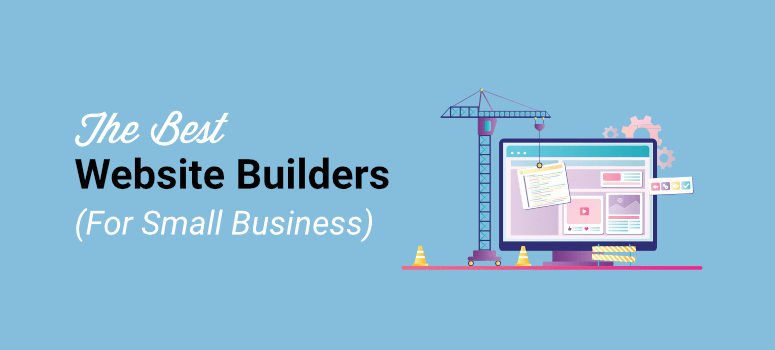
Are you looking for the best website builder to create a website on your own?
It was not too long ago that you needed to know how to code or hire a web developer to build a website. But that isn’t the case anymore.
Website builders have made it incredibly easy for anyone to create a website. And the best part? You can do it with little or no investment!
In this guide, we’ve compared the top website builders, both paid and free. We’ll walk you through their features, pros and cons, pricing, and even tell you who it’s best suited for.
By the end of this post, you’ll know everything you need about the top website builders so that you can pick the right one to build your website.
Choosing the Best Website Builder- What to Look For?
Website builders are easy to use but there are a few things you need to consider when it comes to choosing the best website builder for your needs. Some of them are:
Budget: For small businesses, this is one of the most important factors to consider. You want to pick a builder that makes it affordable to create and manage your own website. Some builders may start off cheap and bump up the price later. Ideally, you want to pick a builder that makes it easy and affordable to scale as your business grows.
Ease of use: If you’re an absolute beginner, you might consider a solution that comes with templates and an easy-to-use drag-and-drop visual builder. This will let you design your website as you would see it when it’s live. You won’t need any design skills whatsoever.
Technical control: If you can handle web hosting, backups, and security comfortably, then you might want to choose a robust website builder, preferably a self-hosted solution such as WordPress.org. These builders give you better control over your website and its configurations.
If you want to skip these tasks and let your website platform handle them, then you’re better off choosing an all-in-one solution like Wix. But keep in mind that you’ll lose control of your website customizations and settings as the website builder will handle that for you.
With these features in mind, we’ve picked the top website builders for small businesses. Since this is a long list, we’ve categorized it according to the type of website you want to build:
Best Website Builders for Small Business Websites
1. Self-Hosted WordPress
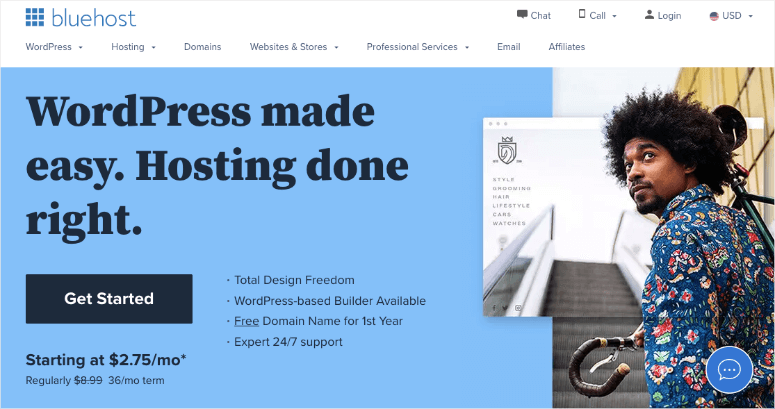
WordPress.org, also known as self-hosted WordPress, is the most popular website builder in existence. Almost 40% of the internet uses WordPress to create blogs, small business sites, online news publications, enterprise websites, you name it.
With WordPress, you can find dozens of themes so you won’t have to start from scratch. You just have to pick the theme that suits your brand the best. Then, there’s a default page builder to customize your site.
If that’s not enough, you’ll find plenty of intuitive website and page builder plugins that you can install on your site such as SeedProd, ThriveThemes, Beaver Builder, Elementor, and Divi. These plugins make it easy to design your website as it appears on the frontend so you never have to touch any coding.
SeedProd and Thrive also come with landing page builders to create individual stunning pages and blog posts for your website. With WordPress, if you want a new feature on your site, there’s a high chance you’ll find a plugin to help you add it. The WordPress plugin repository has over 55,000 plugins, both free and paid.
Keep in mind that there are two versions of WordPress: WordPress.com and self-hosted WordPress. It’s easy to get confused between the two. For more details, you can check out our comparison: WordPress.com vs self-hosted WordPress.
You may also want to check our step-by-step guide on how to move from WordPress.com to WordPress.org with ease.
We recommend the self-hosted option because it’s more flexible and gives you complete control of your website.
Pros:
- Free: WordPress is a free and open-source platform – fair and square. It’s also extremely popular so it’s available on almost every web hosting platform.
- Easy to use: It’s easy to set up and gives you endless customization options to create a website the way you want. There are also tools like Astra that come with starter templates. You can import an entire premade website and you’ll only need to make changes to the text and images. Everything else is already set up for you.
- Extensions: You can easily extend your website’s look and functionalities using WordPress themes and plugins. Many of these are free but you can also find premium ones that have better features, functionality, and customer support. You’ll find a tool for just about everything to optimize your site’s SEO, speed, and performance.
- Marketing: WordPress gives you access to plenty of marketing and promotional tools. For instance, if you want to create popups and signup forms, you’ll find plugins like OptinMonster and WPForms.
- eCommerce: There’s a free eCommerce plugin called WooCommerce to set up an online store. It lets you create products, add shopping carts, accept payments online, handle shipping and taxes, and more. You also get access to tons of eCommerce tools that you can use to enhance your store.
- Control: You get complete control over your website design and configuration. You have the freedom to choose your web host, backup, security, and much more!
- Support: WordPress has a huge support community. You can get help for anything you need by asking on WordPress forums.
Cons:
- There’s a bit of a learning curve compared to other hosted solutions. But there are lots of WordPress tutorials to help you out.
- You’ll need to manage backup and security yourself.
- You have to update your WordPress installation, themes, and plugins on your own.
- You can’t create a website for free. You’ll need to buy a domain name and web hosting.
We must mention that if you want to hand over WordPress maintenance tasks, web hosts offer managed WordPress hosting. It costs a bit more but they will take care of the technical aspects of your site so you can concentrate on growing your business.
Who Is It For?
WordPress is best suited for anyone who wants to build a website regardless of their skillset. It’s the cheapest website builder for beginners, yet it provides more features and full control over your site.
If you’re a developer and prefer to have access to CSS, HTML, and cPanel, then WordPress is the best option.
WordPress is hands down the best choice for entrepreneurs, small business owners, all the way to large corporates as it’s scalable and gives you control over how you expand your site.
Check out this WordPress website builder review for more details.
Pricing
WordPress is an open-source, free web design software, but you’ll have to purchase a domain name ($14.99 per year) and web hosting ($7.99 per month) to start a WordPress website. If you need a drag-and-drop solution to build a website, all you have to do is install a page builder plugin.
Because the combined cost of both the domain and hosting can seem like quite a lot, we’ve worked out a deal with Bluehost for IsItWP users. You’ll get a free domain name, free SSL, and over 72% off on WordPress hosting. You only have to pay $2.75 per month.
You can also get high-quality hosting with Hostinger. Using our exclusive IsItWP deal, you can get started at just $2.69 per month. It comes with a free domain, SSL, and email. Plus, you also get unlimited bandwidth, 100 GB SSD storage, and Managed WordPress.
Get started with Self-Hosted WordPress!
2. Web.com
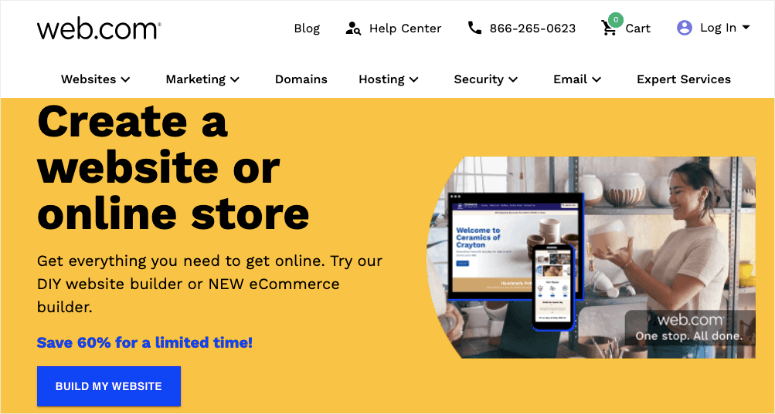
Web.com is one of the original and most popular do-it-yourself website builders on the market. It has one of the lowest starting costs making it affordable for anyone to launch a website.
Building your site is super simple with the intuitive drag and drop builder. Plus, they offer a ton of readymade website templates to get you started FAST. All of the templates are 100% mobile-friendly and customizable.
You also get access to thousands of stock images and photos so you can easily customize your site without having to spend on expensive memberships to stock photo sites.
All Web.com plans come with a free domain name for one year. You can also add on a business email address, SEO tools, website analytics, website security solutions, and more.
Pros:
- Easy drag and drop builder with features like photo galleries, social media buttons, contact forms, testimonial sliders, and more.
- Fast website loading times and the ability to add unlimited web pages to your site.
- eCommerce features to sell products, track and manage orders, and securely accept payments online.
Cons:
- Blogging functionality is limited compared to other website builders like WordPress.org.
- The eCommerce plan only allows you to add 50 products.
- Web.com starts off cheap but becomes expensive after the first month.
Who Is It For?
Web.com is a great small business website builder for those who have limited resources and need a non-technical solution.
Pricing
The Starter website plan starts at only $1.95 for the first month and renews at $19.99 per month. Or you can subscribe for a year and pay just $4.95 per month.
With an annual subscription, you can also include marketing tools in your plan and pay $7.95 per month. If you want to expand to an online store, then that comes at $13.95 per month (billed annually).
3. Gator Website Builder
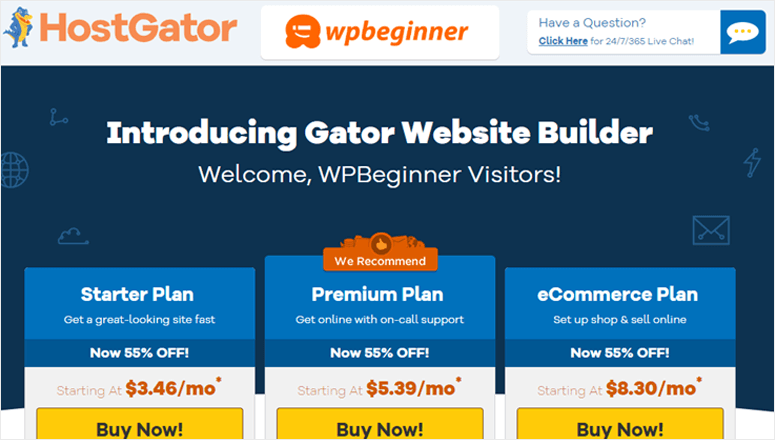
The Gator web builder is created by HostGator, a renowned web hosting company. Gator is probably one of the most feature-rich website builders offered by a web hosting company.
The best thing is that Gator is developed in-house to provide super-fast web experience to visitors.
The Gator Website Builder package includes free web hosting, a domain name, website analytics, and a free SSL certificate to keep your site secure and help you rank high in search engines.
Pros:
- Cheap introductory price
- Website analytics is included with all plans
- Extensive collection of templates available
- Drag and drop website builder
- Save history feature to revert back to previous designs
Cons:
- No free plan is available to try out the service
- Priority support is only offered in Premium or higher plan
- eCommerce integration is only available with the more expensive eCommerce plan
Who Is It For?
If you have a hosting plan from HostGator, it may make sense to use the Gator website builder. This will streamline your website management.
Pricing
There are 3 plans: Starter, Premium, and eCommerce. We’ve negotiated a deal with HostGator, so as an IsItWP user, you’ll get a special discount on their introductory pricing. Take a look at their introductory price below.
Starter: Starting at $3.46/mo (All features included)
Premium: Starting at $5.39/mo (With priority support)
eCommerce: Starting at $8.30/mo (eCommerce integration)
Get started with Gator Website Builder!
4. HubSpot Website Builder

HubSpot Website Builder is a powerful all-in-one content management system that lets you create blog posts, site pages, landing pages, and emails from one place.
It also comes with HubSpot’s well-known CRM and marketing automation tools. With these tools, you can create a website experience that’s personalized to every website visitor.
Another unique feature is HubSpot’s adaptive testing. This lets you choose up to 5 different versions of a web page, and HubSpot will monitor and serve the best-performing version.
Pros:
- Create a site in minutes with pre-built website themes and the easy drag and drop editor.
- Personalize website content based on location, device, source, language, or any detail stored in your HubSpot CRM.
- Comes with business tools like email marketing, detailed analytics, live chat software, multi-language content support, and more.
- There’s a free plan available but doesn’t include CMS capabilities.
Cons:
- Not suitable for creating online stores or advanced business websites.
- Marketing automation features can be intimidating for beginners.
Who Is It For?
HubSpot website builder is best for marketers and small businesses that want to create simple websites and get access to powerful marketing automation features at the same time.
Pricing
The Starter website plan starts at $30 per month.
There’s also a Professional plan which starts at $800 per month and an Enterprise plan that starts at $3,600 per month. These discounted prices are applicable when billed annually.
If you’re not ready to invest, you can try HubSpot’s free website builder. It lets you get started with landing pages, forms, live chat, email marketing, and more. This is perfect if you want to create a personal website.
Get started with HubSpot Website Builder!
5. Squarespace

Squarespace is a full-featured website builder that comes with all the tools you need to build a beautiful website. You can also choose from dozens of website templates for your site. Each template comes with hundreds of customizable features.
Added to that, you can register a domain name for free with your annual Squarespace subscription.
It’s the best platform for artists, photographers, and content creators.
Pros:
- Choose from an extensive collection of built-in site templates.
- With any plan, you get unlimited bandwidth and unlimited storage.
- No transaction fee is charged for eCommerce transactions with their eCommerce basic or advanced plans.
Cons:
- Unlike most website builders, Squarespace doesn’t offer a free plan.
- The starting plan is a bit expensive compared to other builders.
- No third-party apps or extensions are allowed.
You can get started with Squarespace but as you grow, you may find it difficult to scale. You can switch over to WordPress later but the process is a bit technical. See how it works here: Switching from Squarespace to WordPress.
Who Is It For?
If you’re after an all-in-one website builder that lets you easily build a website from scratch without having you to sign up for a third-party service, then Squarespace could be the best choice. Since all the necessary tools are available to you right out of the box, you don’t have to pay extra for templates, addons, or any other services.
Pricing
You can get started with the basic plan for free. The Personal plan costs you $16 per month, which lets you build unlimited pages with unlimited bandwidth and storage.
To add an eCommerce storefront to your Squarespace website, you can choose the Business plan for $23 per month. And to waive off transaction fee on your online store, you can upgrade to the Basic Commerce plan that costs you $27 per month.
There’s a 14-day money-back guarantee on all plans.
6. WordPress.com
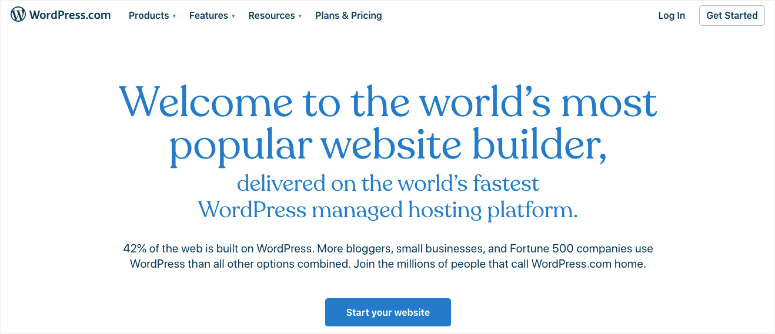
WordPress.com is a free blog and website hosting service run by Automattic, the same folks behind WordPress.org. WordPress.com enables you to focus on your content without having to worry about the technicalities of handling a website, such as hosting, security, or backups.
In a nutshell, WordPress.com makes it easy for anyone to publish a website online, regardless of their budget. The platform is popular among bloggers who want a free space to write.
Pros:
- WordPress.com is an SEO-friendly publishing platform.
- It enables you to create a free website with a WordPress.com subdomain.
- Out of the box, it comes with all the essential features you’ll need to build and grow your website.
Cons:
- While you get many enhanced features with their premium plans, they still lack functionalities that you can avail from self-hosted WordPress.
- If you want enhanced functionalities on your site, like Google Analytics tracking, custom domain name setup, plugins, support, etc. then you might consider upgrading to a premium plan.
- Even if you’ve subscribed to a premium plan, you must abide by WordPress.com’s Terms of Services, which means, among other things, you can’t accept payments, host AdSense ads, or monetize your site with affiliate marketing.
Who Is It For?
If you prefer building a website on a reliable publishing platform over a drag and drop builder, then WordPress.com is the best choice for you. If you want to get complete control over your site, then you might want to use WordPress.org instead.
Pricing
The basic plan is free and you can get started without a credit card but it comes with limited features. To connect a custom domain name and remove WordPress.com ads, you can choose the Personal plan for $48 per year. If you want to monetize your site, then you’ll need to pay $96 per year for the Premium plan.
For advanced features like unlimited storage space, plugin installation, Google Analytics integration, you can choose the Business plan for $300 per year.
Get started with WordPress.com!
7. Wix
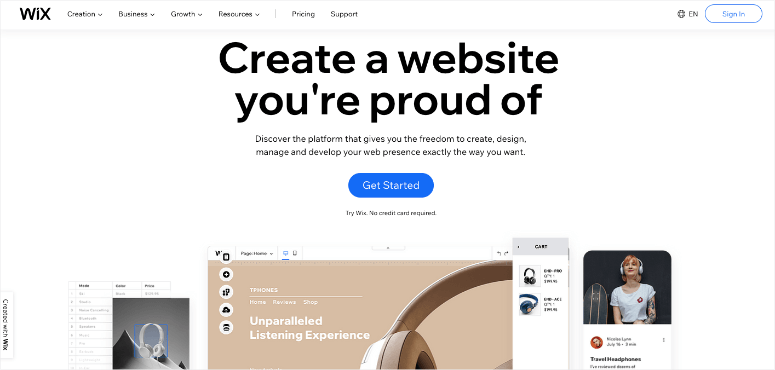
Wix is an easy website builder for beginners. You can choose from hundreds of designer-made pre-built templates for every kind of business. You can create stunning websites with parallax, animation, and video backgrounds, all without having to touch a single line of code. The platform also comes with limited eCommerce functionality.
Pros:
- Wix comes with a free plan with limited functionalities to create a website with drag and drop.
- You can easily integrate advanced features into your site such as an eCommerce storefront.
- Wix websites are mobile-friendly, meaning your site will look great on all devices.
- The Wix App Market offers 250+ powerful web apps for your Wix website
Cons:
- Your website will display Wix-branded ads unless you upgrade to a premium version.
- The ability to customize your site, widgets, and configurations is limited.
- Switching over to another platform, should you decide to move, is difficult.
Who Is It For?
Wix is best suited for beginner-level users who need a drag and drop solution to create a website. With a premium Wix plan, you can use your own domain name, remove Wix ads, integrate your website into Google Analytics, and more.
However, if you want a website builder that gives full control over your site, then you might use a self-hosted WordPress website instead.
Pricing
Wix offers a limited free plan with a Wix branded subdomain. Their starting Combo plan costs $16 per month, which gives you a free domain name, allows you to connect it with your site and removes Wix brand ads.
You can add an eCommerce storefront to your site for $27 per month.
8. GoDaddy Website Builder
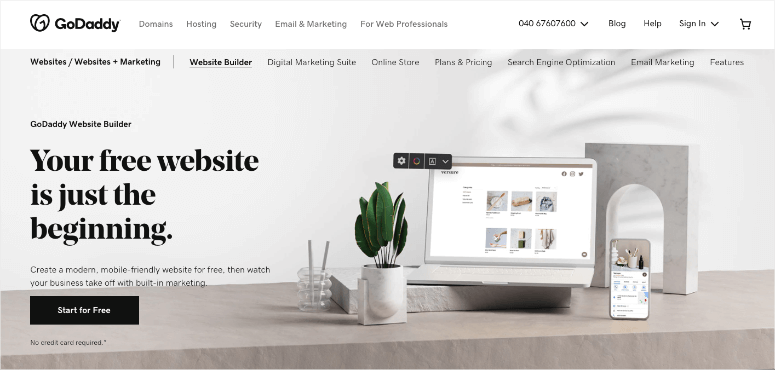
GoDaddy is a popular domain name and web hosting provider on the market. It also offers an AI-powered website builder to get your site up and running quickly and easily.
GoDaddy’s site builder is simple and limited in features. So it’s possibly the easiest website builder for beginners and will be most ideal for individuals or small websites that want to establish a basic online presence.
Pros:
- It’s mobile responsive so you can launch and customize your site even using a mobile device or tablet.
- It comes with readymade blocks to create and customize your website in just a few clicks.
- It integrates with Getty Photography library, which means you will have access to professional stock photos for your website.
Cons:
- Unlike other website builders, it has limited features and limited design options.
- Once your website is ready with GoDaddy Builder, it’s not easy to move to other platforms like WordPress.
Who Is It For?
GoDaddy Website Builder is an ideal solution for users who have purchased a domain name from GoDaddy and want an easy way to start a site.
Pricing
GoDaddy has a pricing plan for you based on the type of website you want to build.
- Basic plan: Get started at $9.99 per month
- Standard plan: Build a small business site for $10.49 per month
- Premium plan: Get advanced features at $14.99 per month
- eCommerce plan: Sell online at $16.99 per month
Get started with GoDaddy Website Builder!
9. BoldGrid
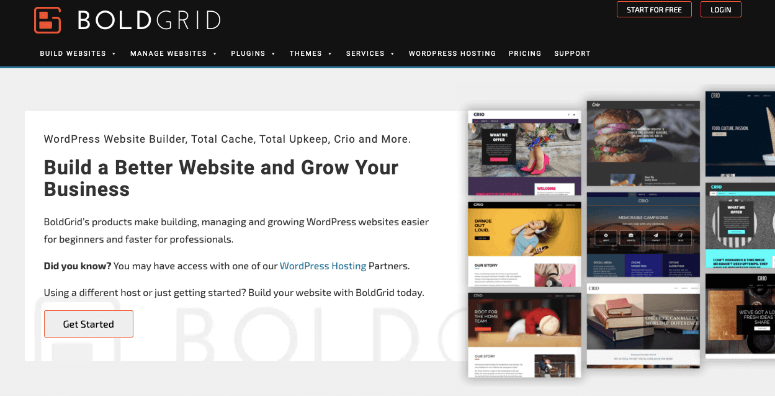
BoldGrid is a free WordPress website builder plugin released by InMotion Hosting. It also offers a hosted website builder solution.
It’s easy for beginners to get started with a website using themes and a drag and drop editor. This also means it’ll be faster for seasoned professionals to build a website.
Pros:
- It comes with built-in themes for your WordPress website.
- It has a user-friendly drag and drop website builder to customize colors, fonts, navigation menu, and more.
- It offers GridBlocks that you can use to create a custom landing page or page layout easily.
- BoldGrid is compatible with WooCommerce, and you can use a built-in theme to design storefront.
- It lets you create a staging website in 1-click. You can test your plugins, themes, design combinations, and more on the staging site and it doesn’t affect your live website.
Cons:
- It’s built for WordPress and works with a self-hosted WordPress website only.
Who Is It For?
If you have a WordPress website and you want to take a grip on customization, then BoldGrid is the right choice for you.
Pricing
The BoldGrid WordPress plugin is free to download and use. The pro version costs $5 per month and comes with a 30-day guarantee.
InMotion Hosting is the official BoldGrid hosting partner. If you’re using InMotion Hosting, then it’s easy to set up BoldGrid in just a few clicks.
We’ve covered the top website builders but you may still be wondering what is the best platform to build a website where you can sell online. We give you the details on that next.
Best eCommerce Website Builders
Before we get to the list of the best eCommerce website builders, we need to mention that you can create an online store with WordPress.org using the WooCommerce plugin. It’s also the best eCommerce website builder for beginners. It’s straightforward and extremely easy for anyone to start an online store with no prior experience.
You’ll get all the features you need to create an eCommerce store such as product listings, pricing, shipping, taxes, payment gateways, and much more.
See our guide on How to Create a Profitable Online Store in 2021 – Step by Step.
Having said that, there are dedicated eCommerce platforms that we’ve listed below.
10. Shopify
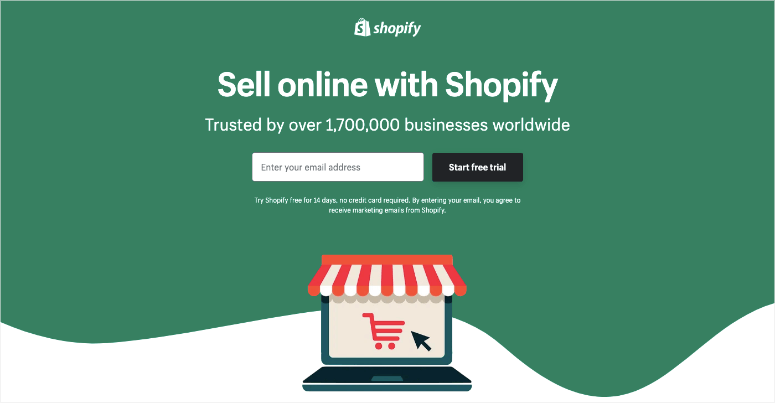
Shopify is a fully-fledged website builder designed specifically for eCommerce businesses and budding entrepreneurs. It enables you to set up an online store in minutes without having to touch any code.
Shopify is incredibly popular as it provides a complete solution to start selling online. It takes care of hosting, backups, maintenance, and more.
Despite being a complete eCommerce platform, Shopify provides a web-based website builder and blogging platform to help you scale up your eCommerce business.
Pros:
- All Shopify themes are fully responsive, meaning your customers get a consistent shopping experience regardless of their devices.
- The web designer is user-friendly and feature-rich
- You can also extend your online store with add-ons from the Shopify app store.
- Without any third-party accounts, you can start accepting payments on Shopify. Additionally, it supports 100+ third-party payment gateways and provides seamless integration with your website, Facebook page, etc.
Cons:
- For eCommerce sites that need multi-level categories and more product details, Shopify might not be the right choice.
- If you use an external payment gateway, then you’ll be charged a heavy transaction fee, ranging from 0.5 to 2%.
Who Is It For?
Shopify is one of the best eCommerce platforms to build an online store. Compared to other online store builders, Shopify is transparent with their fee structures.
If you want more control over your eCommerce store, then you might want to choose a self-hosted eCommerce platform, like WooCommerce. Learn more about building an online store with WooCommerce.
Pricing
Shopify’s basic paid plan costs you $29 per month. In addition, the basic plan charges you 2% transaction fees.
To reduce the transaction fee to 1%, you can upgrade to a higher plan for $79 per month.
The advanced plan is for those who want to scale their business and need advanced reporting. The plan carries a low transaction fee of 0.5% but will cost you $299 per month.
11. BigCommerce

BigCommerce is a popular online store builder that comes with tons of out-of-the-box features. Just like Shopify, BigCommerce is also a standalone eCommerce platform. That means you can either set up a store on BigCommerce or even integrate the storefront into your WordPress site.
Pros:
- Essential features are offered as a standard feature, such as SEO options.
- Offers a lot of built-in features than their competitors.
- BigCommerce comes bundled with tons of marketing features such as coupons, product recommendations, and gift certificates.
Cons:
- Design options are not as extensive as their contenders.
- Editing interface is not very intuitive.
- No mobile app.
Who Is It For?
If you’re looking for a fully-fledged eCommerce store builder, then BigCommerce is the right choice for you.
Still not convinced? Check our post on the best BigCommerce alternatives.
Pricing
BigCommerce’s Basic plan starts at $29 per month, which comes with all the necessary features.
The Plus plan costs $79 per month by which you get a lot of conversion optimization features.
With their Pro plan, you get advanced features for $299 per month.
12. Weebly

Weebly is yet another website builder that allows you to build a beautiful website with drag and drop. Weebly makes onboarding easy with its tailored, step-by-step guidance. With Weebly, you can easily add a blog or integrate a storefront into your website.
Pros:
Weebly comes with powerful tools to create a beautiful website including drag and drop, pre-designed layout options, website stats, and more.
Weebly also has a free plan that allows you to use a free subdomain of Weebly.com. Users can easily upgrade to a premium plan for additional features, including custom domain support, site stats, site search, etc.
Cons:
- The built-in features are limited.
- It offers only a limited number of integrations.
- Exporting your Weebly site to another platform can be quite difficult.
Though Weebly is a great platform, it lacks certain features you’ll need to scale your website and online business. You can switch to WordPress later. See our tutorial on how to move your website from Weebly to WordPress.
Who Is It For?
If you need a drag and drop solution to quickly build a WordPress site, then you might want to give Weebly a try.
Pricing
Weebly offers a limited free version for beginners. You can connect a custom domain name to your site for just $10 per month. To remove Weebly brand ads on your site, you’ll have to upgrade your plan to Professional which costs $12 per month.
If you want to build a full-fledged eCommerce store, then choose the Business plan for $26 per month.
It’s worth mentioning that there’s also another platform called SiteBuilder. They have now partnered with Web.com. If you are an existing SiteBuilder customer, you can log in and create your site. However, all new customers can sign up on Web.com.
Now that we’ve reviewed and compared the top website builders on the market, we’ll give you our final verdict.
Which is the Best Website Builder for Small Businesses?
The best overall website builder is WordPress.org. It’s beginner-friendly, easy to use, and scalable.
Added to that, you get complete control of your website. This means you can change your hosting, theme, plugins, and everything about your website as and when you want. You also get complete control over your backups and security as well.
To top it off, if you face any issues, you have a solid community to rely on. You’ll also find plenty of tutorials and resources on websites like IsItWP and WPBeginner.
You can even set up a WooCommerce store for free. So you can start selling products on your website right away! Website building is easy, affordable, and flexible with WordPress.
To recap, here’s our list of the best website builders:
- Self-Hosted WordPress: #1 website builder to create any website
- Web.com: Best website builder for beginners
- Gator Website Builder: Simple and budget-friendly website builder
- HubSpot Website Builder: Best builder with marketing tools and automation
- Squarespace: Best builder for photographers, artists, and content creators
- WordPress.com: Free managed websites with limited options to monetize
- Wix: Easy to use builder but with extremely limited control
- GoDaddy Website Builder: Simple builder for a basic online presence
- BoldGrid: Visual drag and drop WordPress website builder
- Shopify: Popular all-in-one eCommerce platform
- BigCommerce: Another powerful platform to sell online
- Weebly: Best builder for small online stores
That’s our pick of the top website builders to create your own professional website.
Best Website Builder Alternative
As mentioned, these site builders are easy to use. But you may struggle to learn WordPress or lack the time to build your website.
Another route you can take to build your site is hiring a developer. Since you will be dealing with individuals hiring a developer is often expensive and time-consuming.
So, a good way to bridge this gap is to hire a WordPress agency. Since this is a team, you enjoy the benefits of hiring a developer at a more affordable price and with a quicker turnaround time.
A good WordPress agency you can look at is SeaHawk Media.
Their experienced team handles everything from day-to-day maintenance to SEO, content creation, and more, leaving you free to concentrate on business growth.
They can also help with long-term projects like site design, seamless migration, or managed SEO. Seahawk simplifies the setup process by offering one-on-one consultations, ensuring a quick launch.
FAQs
1. Which is the best platform to create a website?
We believe that WordPress is the best platform to create a website. It’s budget-friendly and gives you complete control over your site’s modifications.
2. Is Wix a good website builder for beginners?
Wix is one of the most beginner-friendly website builders. You can use a template and replace the content with your own which means you can get your website up and running in a matter of minutes. And with the Wix ADI builder (artificial design intelligence), you need to feed in your information and it’ll create a basic website for you. However, you’ll get limited options to customize and grow your site.
3. Is Wix or WordPress easier?
Both Wix and WordPress are easy to use but because Wix comes with the ADI builder, we would say that Wix is easier to use for a basic website. However, you can also import full demo websites in WordPress and change the content to make it your own design. In the long run, WordPress is the better option.
3. What is the easiest website builder for beginners that’s free?
WordPress.org is the best free website builder but you’ll need to buy a web hosting plan and a domain name. If you don’t want to make any investment, then HubSpot and WordPress.com have 100% free plans and are the best choices.
4. What are the features of the best website builder for beginners?
When you’re a beginner and want to build a website, make sure your website builder offers the following:
- Readymade templates that are optimized for mobile
- Drag and drop visual builder
- Customization options to create a unique look
- Option to migrate to other platforms
5. Which website builder is easiest to use?
The easiest website builder is WordPress.org. It gives you access to an admin panel that’s user-friendly so anyone can manage and grow their website. There are also tons of third-party themes including complete demo websites that you can import. Plus, it’s home to 63,000+ free and paid plugins that you can use to add any feature you want or solve any issue you face. WordPress is the best website builder for beginners, small businesses, freelancers, large corporations, eCommerce stores, and just about anyone else.
6. Are there more website builders?
Yes, we’ve mentioned the top website builders that are perfect for beginners and small businesses, though there are more website builders like Jimdo, Strikingly, Site123, Webflow, and Duda.
We hope you found this post helpful. Next, we’ve picked these posts to help you set up your website with ease:
- How to Make a Website From Scratch (Step by Step)
- How to Create a Profitable Online Store – Step by Step
- How to Customize a WordPress Website [Beginner’s Guide]
- The Ultimate List of Tools and Software for Small Businesses
These posts will help you get started with creating, marketing, and promoting your website to grow your business.

Comments Leave a Reply